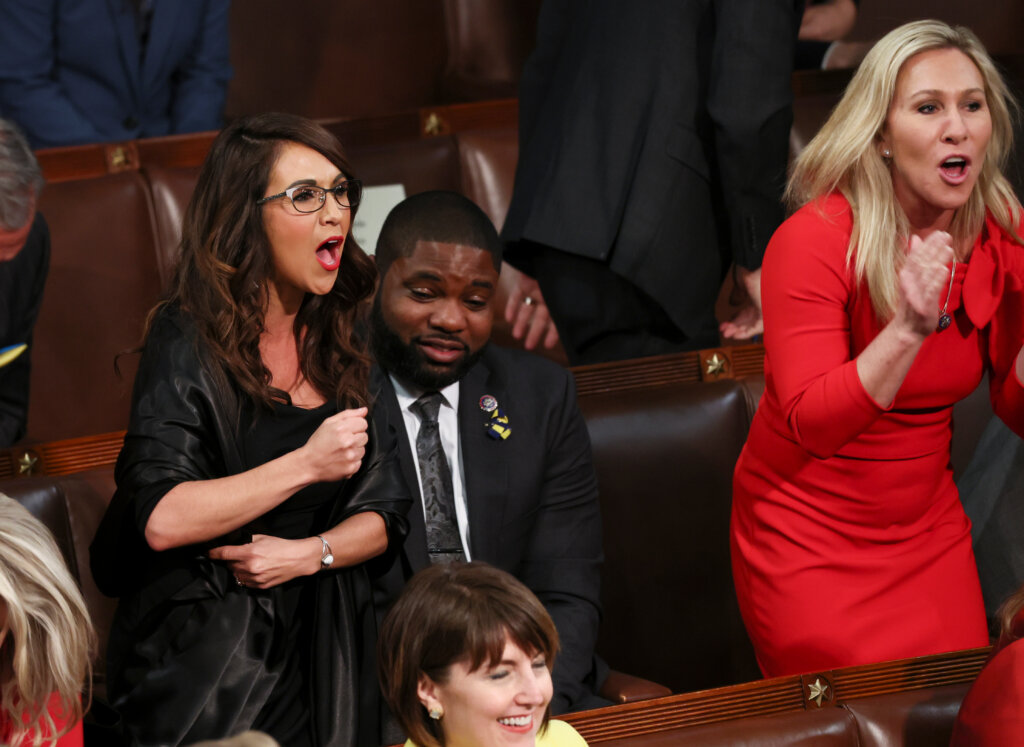A guide to the most notable Christian nationalists influencing the nation
Elected officials and online influencers alike are shaping a religious political ideology to guide the US

Trump has promised increased influence to Christians as president. Courtesy of Canva/Mira Fox
With Donald Trump elected for a second presidential term, theories are already flying about who will get posts in his administration, and what his policy priorities might be. Some of Trump’s agenda has been obvious, thanks to repeated themes at his rallies — retribution against enemies and mass deportations, for example.
But in private, to groups of pastors and Christian activists, Trump has been promising something else: ideological influence over the White House, and the country.
Powerful individuals and interest groups have been working to erode the boundary between church and state, hoping to create a country ruled by Christianity, and they see Trump as a divinely appointed soldier to help them do so.
Many are guided by the principles of the Seven Mountains Mandate, a Christian Dominionist movement that teaches that Christians must control seven areas of social life: family, religion, education, media, arts and entertainment, business and government — by force if necessary — to ensure that Christian values are enforced in all areas of society. While not all Christian nationalists believe other religions can’t exist in their version of the U.S., all believe that Christians should be in charge of society to the exclusion of other groups.
As the country prepares for a second Trump term in office, here are a few of the most important names in Christian nationalism and extremism.
Marjorie Taylor Greene, Lauren Boebert and Mike Johnson

Marjorie Taylor Greene, the representative from Georgia, is well-known for her odd pronouncements about Jewish space lasers. But she’s also a proud, self-declared Christian nationalist, who has pushed her party to cater more to a base of Christians.
“We need to be the party of nationalism,” she said at a Turning Point USA event in 2022. “I am a Christian and I say it proudly, we should be Christian nationalists.”
Meanwhile, Lauren Boebert, the Colorado Republican, has generally avoided overtly using the term Christian nationalism. But she has demonstrated her affiliation with its ideas, railing against “this separation of church and state junk,” saying that “the church is supposed to direct the government.”
Mike Johnson, the current speaker of the House of Representatives, hangs a flag associated with the New Apostolic Reformation, a Christian nationalist movement, outside his office. Though he, too, has avoided self-identifying as a Christian nationalist, he has claimed that the Constitution does not actually provide for a separation of church and state.
Lance Wallnau

Televangelist Lance Wallnau, a pastor in the Christian nationalist New Apostolic Reformation movement, was a major part of getting out the vote for Trump. His “Courage Tour,” a series of tent revival-style events across the country, framed Democrats as a demonic influence and Trump as a God-appointed savior who would put churches in charge of the nation.
Wallnau espouses the Seven Mountains Mandate, a movement he helped, including co-writing a book on the ideology called Invading Babylon: The 7 Mountain Mandate.
New Apostolic Reformation is a loose movement within Christianity that has been growing since Trump’s first term in office. It is characterized by its central teachings on the need for Christian political control, or “dominion,” achieved through spiritual and political “warfare.”
Wallnau has been called “the father of American Dominionism” and self-identifies as a Christian nationalist. He praised the rioters on Jan. 6 as fighters for God and has refused to condemn the attacks. “Jan. 6 was not an insurrection,” he said in 2024. “It was an election fraud intervention.”
David Barton
Author and political activist David Barton is perhaps best known for his books promoting a false historical account that the Founding Fathers never intended to separate church and state, and instead set out to create a Christian nation. His version of history has helped Christian nationalists argue that their vision of a Christian country is grounded in the Constitution, but is so filled with inaccuracies that his publisher, Thomas Nelson, a Christian publisher, pulled his book The Jefferson Lies — but not before it became a New York Times bestseller.
Barton, who was the chairman of the Texas Republican party until 2006, and has consulted numerous Republican campaigns, including for George W. Bush and Ted Cruz, argues that the Founding Fathers “never intended the First Amendment to become a vehicle to promote a pluralism of other religions.”
The Ziklag Group
Many influential Christian nationalist figures, including Barton and Wallnau, are involved with the Ziklag Group, a tax-exempt charity group that works to instill Christianity as the guiding principle in every sector of American society, guided by the Seven Mountains Mandate. It describes itself as a “private, confidential, invitation-only community of high-net-worth Christian families.”
A massive ProPublica investigation that got access to the group’s members-only emails and briefings found that the group had spent at least $12 million working to get out the vote for Trump. During Trump’s first term, the group brought in influential Republican speakers, including Ted Cruz and Mike Pence; the group also took credit for Supreme Court Justice Amy Coney-Barrett’s nomination.
Ziklag’s own internal documents on its mission say that the group is united by the belief that “the biblical role of government is to promote good and punish evil” and that “the word of God and prayer play a significant role in policy decisions.”
Stew Peters
A familiar figure at the ReAwaken America rallies, a traveling event about COVID-19 denialism that became a get-out-the-vote rally for Trump in 2024, Stew Peters hosts an eponymous podcast in which he espouses anti-vaxx conspiracies, LGBTQ+ hatred, antisemitism and Holocaust denial.
Peters, who has self-identified as a Christian nationalist, often clothes his conspiratorial views in Christianity, arguing that he is simply trying to protect Christians from nefarious actors — usually Jews — who control the government and persecute American Christians.
“We all have one common enemy, his name is Satan, and right now his minions are trying to run the country,” Peters said at a ReAwaken America event. “Liberals, Democrats, Communists, lizard things, we got a lot of words for these creatures.”
Andrew Torba

The founder of alternative right-wing social media site Gab, Andrew Torba, is not shy about his Christian nationalism. Torba’s openly stated goal for Gab, which also offers a suite of other sites including financial services, messaging, ad sales and video conferencing, is to build a “parallel Christian economy.”
Torba is openly antisemitic and encourages the spread of conspiracy theories against Jews who, he says, “psychologically and spiritually castrate” Americans.
The Gab founder’s Christian nationalism is codified into a book on the topic, Christian Nationalism: A Biblical Guide for Taking Dominion and Discipling Nations.
In it, Torba advocates “to reestablish states that recognize Jesus Christ as King, the general Christian faith as the foundation of state government, and state laws that reflect” the Bible.
Nick Fuentes

Trump made headlines in 2021 after inviting online personality Nick Fuentes and hip-hop artist Kanye West to Mar-a-Lago for dinner in the wake of West’s well-publicized stream of antisemitic comments.
While West is the more mainstream celebrity, Fuentes has a devoted online following among “groypers,” a group of right-wing extremists from various ideological backgrounds who all use Pepe the Frog memes as their calling card.
Fuentes’ extremist ideology includes virulent hatred of Jews and frequent Holocaust denial, as well as intense misogyny and homophobia. But he claims these beliefs are based in devout Christianity.
On his regular livestream, Fuentes says things like “God is real, Jesus Christ is God, and yet the country is run by people that don’t believe this, and don’t live by this. And we’ve talked about who they are, they are largely Jewish,” and, “we’ve got to save our country, tell the truth, and have Christian leadership.”
Trump apologized for dining with Fuentes, saying he didn’t realize he was a white nationalist, and Fuentes has since criticized Trump heavily for associating with too many Jews.
Still, Fuentes is an influential figure in the online right, along with other “manosphere” influencers who preach misogyny and hatred to young men. Though Fuentes was banned from mainstream social media platforms, he was reinstated on X (formerly Twitter) after Elon Musk took over the platform, where his posts get thousands of retweets and likes.

















